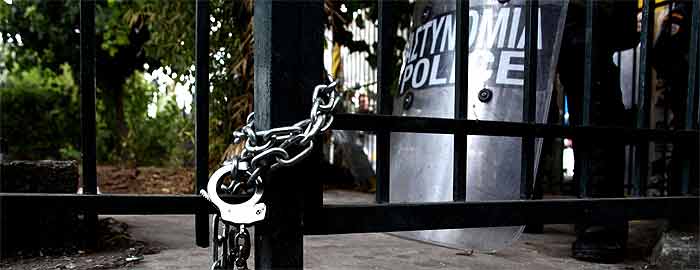Into Darkness: Pulling the plug on Greek Democracy
Speaking on the evolution of the project, Avgeropoulos claimed that it was never his intention to create a documentary solely on the closure of ERT, however, “after the decision of the Supreme Court, the way that the government reacted to this decision, the national outcry, the international outcry, we thought that we have to make a story about this”.
On whether ERT’s closure was representative of a wider trend across Europe in countries such as Spain and Holland, Avgeropoulos, while quick to deny a wider coordinated ‘conspiracy’, did accuse governments throughout Europe, and especially in Greece, of ‘playing politics’ with public services.
“It is pure politics. Nowadays we have a huge confrontation between the private and the public and we can see it in many countries across Europe. We can see it in media, health and education sectors. It is a fight between the public and private.”
However, at the heart of the government’s relationship to media lies a contradiction, which for Avgeropoulos becomes fundamental in understanding the motivations behind the closure of ERT.
“Ironically, the government is controlling the private media, but it is not able to control . . . it couldn’t control, totally, ERT. So there is a paradox here.”
When asked to elaborate on exactly how the government was able to control the private media, Avgeropoulos said that it was a question of funding. Private TV stations, through the support of the government, have access to this funding in the form of loans, with the consequence that there is one line being repeated by all private media channels, extolling the ‘good government’ of Antonis Samaras and supporting the austerity measures as the only course of action available to deal with the crisis.
In response to this and in what Avgeropoulos calls a ‘new and good experiment’, 40 former ERT journalists have rejected the control of private media and begun to self-manage the branch of ERT in the north of Greece, transmitting in direct violation of the government.
“They are broadcasting analogue and through the internet. They have left their families and for 24 hours a day they are operating and broadcasting and keeping this thing alive.”
While this kind of self-managed media platform has similarities with the 2005 Oaxaca strike in Mexico, where (mainly) women took control of the means of information production and dissemination, the current ERT movement represents “another level”.
“This is the first time, I think, this kind of experiment is happening in Europe.”
When questioned over the comparison between ERT’s output and other public service broadcasters across Europe such as the BBC, Avgeropoulos was quick to cite strict government intervention even before ERT’s closure.
“On the other hand, within ERT you still had some small islands of freedom of expression.”
However, during the four moths of self-management in Athens and now in the north of the country in Thessaloniki, removed from any form of governmental regulation or control, output now includes “every voice on the planet”.
“You can see every colour, every opinion, it’s a multi-idea thing. I can’t describe it. It makes you happy . . . it’s freedom.”

What is more, this new self-managed ERT has, for now, remained unaffected by direct government intervention. The national and international outcry has made the government weary of repeating the mistakes of the original ERT closure.
“The government does not want to repeat again these ugly images, because I think, for me the most symbolic picture of what we are living through is the last photograph in the film – of the handcuffs closing the gate of ERT.
“Mitterrand used to say that politics is about the way in which you use symbols, so in that sense the government messed up totally.”
